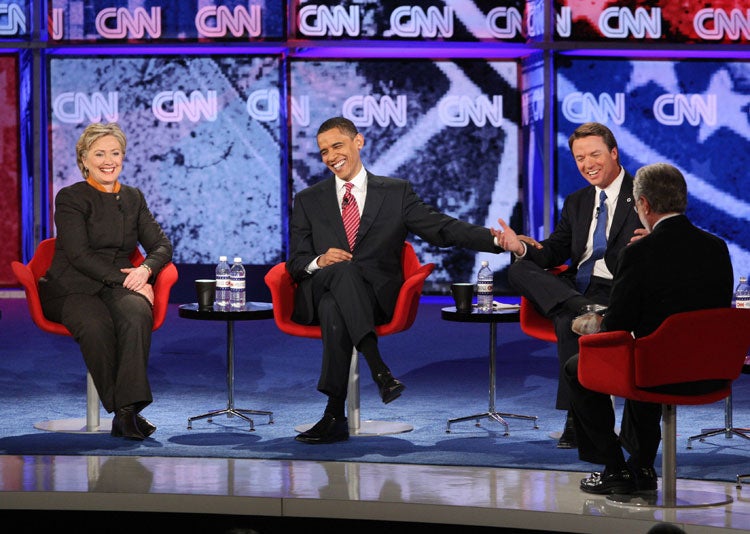Clinton and Obama try to secure Edwards' support

Your support helps us to tell the story
From reproductive rights to climate change to Big Tech, The Independent is on the ground when the story is developing. Whether it's investigating the financials of Elon Musk's pro-Trump PAC or producing our latest documentary, 'The A Word', which shines a light on the American women fighting for reproductive rights, we know how important it is to parse out the facts from the messaging.
At such a critical moment in US history, we need reporters on the ground. Your donation allows us to keep sending journalists to speak to both sides of the story.
The Independent is trusted by Americans across the entire political spectrum. And unlike many other quality news outlets, we choose not to lock Americans out of our reporting and analysis with paywalls. We believe quality journalism should be available to everyone, paid for by those who can afford it.
Your support makes all the difference.Hillary Clinton put a brave face on her campaign trail troubles yesterday, as Democratic voters in Washington DC, Maryland and Virginia prepared to vote in the so called "Potomac primary."
"I know this is a challenging campaign," Mrs Clinton told a few dozen supporters in downtown Washington yesterday. "I recognise that. And it's a good problem to have, isn't it?"
Even if defeated in these three contests, which are centred on the country's political capital, Mrs Clinton still remains in a strong position to seize the Democratic nomination.
However well her opponent Barack Obama does today, she will pick up a proportion of the 171 pledged delegates at stake in the three primaries since they are allocated by proportional representation. The finish line remains elusive in what has already been the longest and most costly Democratic presidential campaign in history.
If the choice is not clear before the Democratic Party's nominating convention in August, some predict civil war in the party, the likes of which it has not experienced since the violence-scarred convention of 1968.
For now, Mr Obama has the benefit of momentum, thanks to a clean sweep over the weekend in Louisiana, Maine, Nebraska, Washington and the US Virgin Islands. A Ipsos poll yesterday showed Mr Obama with a narrow national lead over the probable Republican nominee John McCain (48 per cent versus 42) if the election were held now, while Mrs Clinton was about even.
But for Mrs Clinton there is also the hope that last-minute political rip-tides could sweep her to victory in the nomination race. She has persuaded voters in the past that she is a tried and trusted candidate, less risky in a general election than the charismatic Mr Obama.
Mr Obama was last night making his way to the North Carolina home of the former presidential candidate John Edwards, hoping to persuade him to endorse his candidacy and hand over the two dozen committed delegates he won before dropping out of the race. Mrs Clinton made a secret visit to Mr Edwards last week, giving the press team that follows her campaign the slip by flying to Chapel Hill North Carolina on Thursday.
An Edwards endorsement would shore up Mrs Clinton's support among working- class Americans in crucial primaries ahead. Texas and Ohio, with 334 delegates at stake, vote on 4 March and Pennsylvania with 158 delegates votes at the end of April.
Mr Obama is riding a tidal wave of popular support and a surge of financial donations after his clean sweep of four states over the weekend but in the delegate race, he remains deadlocked and will need to win at least two of the three big states – Texas, Ohio and Pennsylvania to capture the nomination.
In his campaign appearances he now focuses on more nuts and bolts issues at the expense of the soaring oratory he has also employed to generate enthusiasm. At a Virginia High School on Sunday, the high-speed dash from rally to rally suddenly slowed down to a crawl as he took part in a quiet "round table" discussion with five parents and teachers.
The discussion ranged from the need for early childhood education to the steep cuts in fees he is planning for university education should he become elected. It was all part of his campaign's attempt to deflect growing criticism that there is little substance behind his inspirational message.
Mr Obama must also straddle the difficult issue of race at a time when roughly 25 per cent of Clinton voters say that race was a factor in their vote.
Mr Obama handles the race issue with humour. He told an audience he was pleased the name of "his cousin" Dick Cheney will not be on the ballot in November. He was deeply embarrassed to discover he was related to Mr Cheney, rather than someone "cool" like Abe Lincoln or Louis Armstrong.
The Clinton campaign is playing down expectations but momentum remains a strong factor and she could blunt Mr Obama's charge.
Join our commenting forum
Join thought-provoking conversations, follow other Independent readers and see their replies
Comments